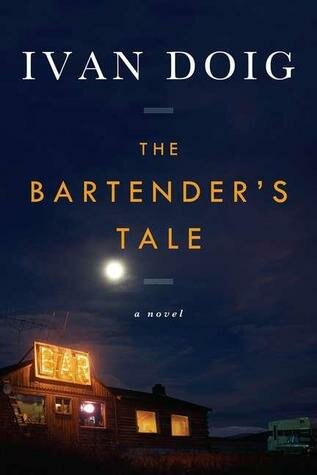 Following on his much-praised Work Song, set in Butte in 1919, Seattle novelist Ivan Doig returns readers to Montana, but this time it’s the ’60s, and the tiny town of Gros Ventre, which, if it’s anywhere, would be up in Glacier National Park.
Following on his much-praised Work Song, set in Butte in 1919, Seattle novelist Ivan Doig returns readers to Montana, but this time it’s the ’60s, and the tiny town of Gros Ventre, which, if it’s anywhere, would be up in Glacier National Park.
It’s a father-and-son story narrated by Rusty (the son) about his bartender father Tom Harry, proprietor of the Medicine Lodge saloon. (Gros Ventre is more commonly known as the name of a Native American tribe, who prefer to go by “White Clay People.”)
Rusty is enduring a lightly Dickensesque, misfit childhood with his Arizona relations when Tom swoops in, scoops him up, and ferries him off to the hinterlands of Montana.
The story goes off in many different directions after that: There’s the exploration of his new home and the struggle to fit in; the more consistently pleasant discovery of Zoe, the new girl in town; surprising revelations about family history; and a drop-in grad student-oral historian named for Franklin Delano Roosevelt, which allows Doig to delve into the silty history of WPA-era dirt dams.
But for Rusty, things keep coming back to the fragility of his bond with his father, even as their rapport grows. Through his novel, Doig makes the penetrating psychological observation that these kinds of wounds aren’t easily healed, don’t respond to reason. The better Rusty gets along with his dad, the more likely he is to be blindsided by changes that conjure the fear of losing everything he’s gained.
This night was the darkest of my life in every way. I lay under strange old heavy blankets in that musty bedroom, listening to the wind, knowing it was whipping up the snow into a ground blizzard, the absolute worst thing for Pop if he was out there somewhere trying to drive home. My thoughts swirled and whirled as well.
By the end of the book, the town of Gros Ventre and its inhabitants have gained the stature of distant relations. Doig has made a long cast with his narrative arc–Rusty’s curiosity about his origins is a lot to hang almost 400 pages on. You come to appreciate the moments that life, in its episodic carelessness, seems to brush Rusty’s concerns aside, and let someone else’s in.
The grizzled sheepherder clutched the shot glass so tightly he seemed to be drinking out of his fist. “I lost a couple hunnerd in this storm,” he said hollowly, “never had it happen before in all the years. Had them out in bunches like I was supposed to, so the ewes could eat a little new grass to help their milk. It started blizzarding so goddamn fast I only got about half the bunches into the shed. The others, they’re froze under the snowdrifts.” Shoulders hunched miserably, he looked like he was about to cry.
On TV in 1960, you could watch the efforts of the original men working on Madison Avenue. In Doig’s telling, the time is almost entirely free of television. Rusty’s entertainment is listening in to bar conversation through an air vent. “Sensational stuff, isn’t it?” asks grad student Del in another context. “Pure lingua americana.” That’s what Doig has cooked up here.